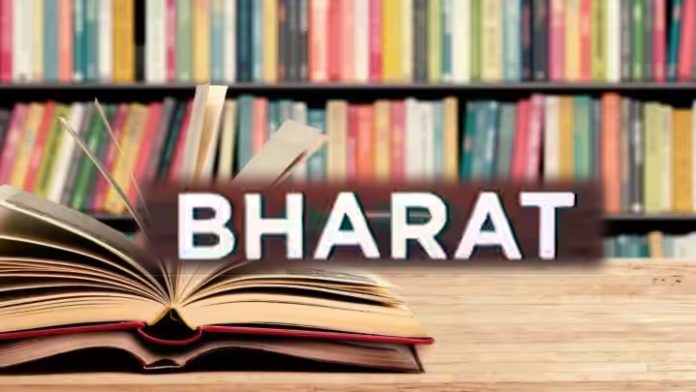NEW DELHI, Oct 25: “India” should be replaced with “Bharat” in the school textbooks for all classes, a high-level committee for social sciences, constituted by the National Council of Educational Research and Training (NCERT) to revise the school curriculum, has recommended.
According to committee chairperson C I Isaac, the panel has suggested replacing the name “India” with “Bharat” in the textbooks, introducing “classical history”, instead of “ancient history”, in the curriculum and including the Indian Knowledge System (IKS) in the syllabus for all subjects.
NCERT Chairman Dinesh Saklani, however, said no decision has been taken yet on the panel’s recommendations.
“The committee has unanimously recommended that the name ‘Bharat’ should be used in the textbooks for students across classes. We have also recommended introducing classical history instead of ancient history in the textbooks,” Isaac said.
“Bharat is an age-old name. The name Bharat has been used in ancient texts, such as Vishnu Purana, which is 7,000 years old,” Isaac said.
The name Bharat first appeared officially when the government sent out G20 invites in the name of “President of Bharat”, instead of “President of India”.
Later, the nameplate of Prime Minister Narendra Modi during the summit in New Delhi also read “Bharat”, instead of India.
Isaac said the committee has also recommended highlighting “Hindu victories” in various battles in the textbooks.
“Our failures are presently mentioned in the textbooks. But our victories over the Mughals and sultans are not,” said Isaac, who is also a member of the Indian Council of Historical Research (ICHR).
“The British had divided Indian history into three phases — ancient, medieval and modern — showing India in darkness, unaware of scientific knowledge and progress. Therefore, we have suggested that the classical period of Indian history be taught in schools, along with medieval and modern periods,” he added.
The NCERT is revising the curriculum of the school textbooks in line with the National Education Policy (NEP) 2020. The council recently constituted a 19-member National Syllabus and Teaching Learning Material Committee (NSTC) to finalise the curriculum, textbooks and learning material for these classes.
“The committee has also recommended the introduction of the Indian Knowledge System (IKS) in the curriculum of all subjects,” Isaac said.
Other members of the committee include ICHR Chairperson Raghuvendra Tanwar, Vandana Mishra, Professor, Jawaharlal Nehru University (JNU), Vasant Shinde, former vice-chancellor of the Deccan College Deemed University, and Mamta Yadav, who teaches sociology in a Haryana Government school. (Agencies)
According to committee chairperson C I Isaac, the panel has suggested replacing the name “India” with “Bharat” in the textbooks, introducing “classical history”, instead of “ancient history”, in the curriculum and including the Indian Knowledge System (IKS) in the syllabus for all subjects.
NCERT Chairman Dinesh Saklani, however, said no decision has been taken yet on the panel’s recommendations.
“The committee has unanimously recommended that the name ‘Bharat’ should be used in the textbooks for students across classes. We have also recommended introducing classical history instead of ancient history in the textbooks,” Isaac said.
“Bharat is an age-old name. The name Bharat has been used in ancient texts, such as Vishnu Purana, which is 7,000 years old,” Isaac said.
The name Bharat first appeared officially when the government sent out G20 invites in the name of “President of Bharat”, instead of “President of India”.
Later, the nameplate of Prime Minister Narendra Modi during the summit in New Delhi also read “Bharat”, instead of India.
Isaac said the committee has also recommended highlighting “Hindu victories” in various battles in the textbooks.
“Our failures are presently mentioned in the textbooks. But our victories over the Mughals and sultans are not,” said Isaac, who is also a member of the Indian Council of Historical Research (ICHR).
“The British had divided Indian history into three phases — ancient, medieval and modern — showing India in darkness, unaware of scientific knowledge and progress. Therefore, we have suggested that the classical period of Indian history be taught in schools, along with medieval and modern periods,” he added.
The NCERT is revising the curriculum of the school textbooks in line with the National Education Policy (NEP) 2020. The council recently constituted a 19-member National Syllabus and Teaching Learning Material Committee (NSTC) to finalise the curriculum, textbooks and learning material for these classes.
“The committee has also recommended the introduction of the Indian Knowledge System (IKS) in the curriculum of all subjects,” Isaac said.
Other members of the committee include ICHR Chairperson Raghuvendra Tanwar, Vandana Mishra, Professor, Jawaharlal Nehru University (JNU), Vasant Shinde, former vice-chancellor of the Deccan College Deemed University, and Mamta Yadav, who teaches sociology in a Haryana Government school. (Agencies)


